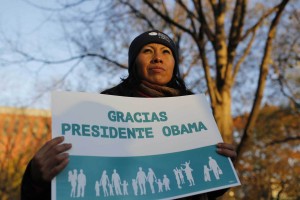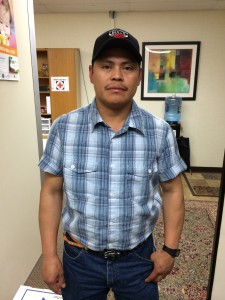President Obama’s executive action on immigration changed lives in Pescadero overnight. On November 20, dozens of South Coast parents who entered the U.S. without papers learned they would be able to raise their children here without threat of deportation – at least for the next three years.
Puente Program Director Rita Mancera believes at least 118 local parents with children in the school district will benefit from the new policy, plus several parents whose children have already graduated or are still too young for school. That’s a substantial segment of the local Latino population.
But many other adults and young people are coping with the realization that they will be excluded from the President’s announcement. Mancera describes the emotional fallout as a mixture of joy, anxiety and sadness.
“It was a lot excitement because many of the families have been around here so many years, living with the constant unknown of whether they will be deported or not,” says Mancera. “But also a lot of families were let down. They will not qualify because they do not have children or because their children are DACA children already.”
The President’s immigration plan will benefit an estimated 4.1 million undocumented adults and 300,000 young people, guaranteeing their safety without offering them a path to legal residency or citizenship. Most are parents whose children are citizens or permanent residents.
The Obama plan also expands DACA, the popular 2012 Deferred Action for Childhood Arrivals program. The expanded DACA program removes the upper age limit (which was capped at 30) and now applies to children who arrived by January 1, 2010.
The news affects California more than any other state, where the majority of undocumented immigrants reside.
These aren’t temporary residents; about 85% have been here five years or more. They contribute to their communities, pay taxes and enroll their American-born children in public schools, which is what the Obama policy explicitly acknowledges.
That’s especially true on the South Coast, where many families set down roots so long ago that their eldest children are now in college. Nationally, 7.7% of k-12 students have a parent who is undocumented.
Mancera moved to the area 8 years ago, and she says most of the families she knows predate her. That’s a long time to live in the shadows.
Puente springs into action
Puente is committed to supporting every eligible local resident through the entire application process from start to finish. On the day of the announcement, Puente jumped into action, printing out a fact sheet about the President’s executive order and circulating it at a public gathering that night. Puente has scheduled a community information session on December 10, where a local immigration lawyer will help explain each step in the process and provide information on what documents to collect.
Staff members have already made personal phone calls to dozens of local youth and families, encouraging them to get ready to apply for the program. Certain people don’t have much of a paper trail and consequently may have a hard time proving their presence in the U.S.; Puente has been advising them on the best way to proceed. And Puente has been telling people to beware of fraudsters who claim they can file their papers before the application window, which does not open for another 90 days for DACA and 180 days for parents.
“The next six months, to us, will be very important for providing stability for people in our community,” says Kerry Lobel. That said, the President’s action didn’t go nearly far enough to create a long-term sense of safety, let alone equality.
“This doesn’t begin to address the need for comprehensive immigration reform that will affect the people who grow our food and clean our houses,” adds Lobel.
Puente is preparing to handle the blitz of applications thanks to the recent training (and upcoming testing and accreditation) of two staff members as professionally trained immigration advocates: Rita Mancera and Alejandra Ortega, Puente’s Youth Program Associate. The BIA [Board of Immigration Appeals] accreditation will vastly expand Puente’s immigration services, such as processing green cards, citizenship papers, and deferred deportation applications. Puente will partner with pro bono lawyers to handle the overflow.
Puente has already helped 19 local youth apply for the Deferred Action for Childhood Arrivals (DACA) program, as well as renew most of them this fall. The legal imprimatur has changed their lives. They’ve obtained Social Security cards, driver’s licenses and work permits. And they’ve stopped looking over their shoulders. Those college-goers also became eligible for financial aid.
But not everyone has been able to benefit. Mancera recalls the day of the announcement talking to a 16-year-old boy, a student at Pescadero High, who entered the country in 2011. Several friends will be eligible for DACA, but he can’t – the cutoff is 2010. For the second time, a presidential executive order does not provide him with relief.
“He was upset. He said, ‘There’s nothing I can do, is there?’ recalls Mancera. “He got left out.”
For more information about the program, email Rita Mancera.




